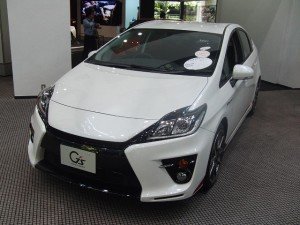Toyota to offer two batteries for Prius
Toyota will be offering two battery options for the upcoming Prius- December 2, 2015
- Industry News
- Posted by Simon
- Leave your thoughts
If you’ve been following recent automotive updates, you would have probably heard by now that Toyota is getting ready to launch the all new hybrid Prius. However, this time buyers will get to choose between two battery packs.
The choices include the old-school nickel-metal hydride batteries and the latest lithium ion batteries.
The benefits
You’re probably wondering what the key difference between the two is. Well, to start off, the lithium ion batteries weigh 35 pounds less and will be available only with the high-end variants of the Prius. It is because the higher end variants already weigh quite a bit due to the increase in mass, as a result of adding extra features. To make up for the weight gain and also, to improve fuel efficiency, Toyota has decided to use lithium ion batteries for the category.
According to Prius’s chief engineer Kouji Toyoshima, it will prevent fuel efficiency from dropping, which is exactly what the car is known for.
The lithium ion batteries have been introduced to address the growing weight issues of the Prius. For instance, the present Prius weighs 22 pounds more than its predecessor and that’s just the basic Japanese spec version. The addition of the new lithium ion batteries will ensure that the upcoming Prius delivers uniform fuel efficiency across all variants.
In the US, the Two Eco variant of the upcoming Prius will deliver 100 kilometers for every 4.4 liters, which roughly translates into 53 miles per gallon. However, that figure is specific to highway driving. The other variants, on the other hand, will deliver 100km per 4.7 liters or 50 miles to the gallon.
The new Prius is expected to hit Japanese car showrooms before the end of December and will be available in US and Europe in the beginning of 2016.
Also, Toyota announced that certain variants of the Prius in Japan will provide 40 kilometers per liter. However, it is because of the domestic testing cycle, which is followed in Japan. Japan does not follow the EPA testing cycle, unlike the West.
Cost of the batteries
To the manufacturer, the lithium ion and the nickel-metal hydride batteries cost the same in terms of production. It is because the lithium ion batteries use only 56 cells, while the nickel-metal hydride batteries come with 168 cells. Voltage for both is roughly the same as well; the lithium ion batteries produce 207.2 volts and the nickel-metal hydride ones produce 201.6 volts. They are also similarly sized. However, they charge 28 percent faster and are smaller than the batteries used in previous versions, thereby creating more storage space at the back of the vehicle
 Deutsch
Deutsch Francais
Francais Espagnol
Espagnol
